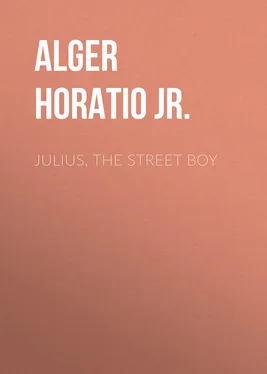Horatio Alger - Julius, The Street Boy
Здесь есть возможность читать онлайн «Horatio Alger - Julius, The Street Boy» — ознакомительный отрывок электронной книги совершенно бесплатно, а после прочтения отрывка купить полную версию. В некоторых случаях можно слушать аудио, скачать через торрент в формате fb2 и присутствует краткое содержание. Жанр: foreign_children, literature_19, foreign_antique, foreign_prose, на английском языке. Описание произведения, (предисловие) а так же отзывы посетителей доступны на портале библиотеки ЛибКат.
- Название:Julius, The Street Boy
- Автор:
- Жанр:
- Год:неизвестен
- ISBN:нет данных
- Рейтинг книги:4 / 5. Голосов: 1
-
Избранное:Добавить в избранное
- Отзывы:
-
Ваша оценка:
- 80
- 1
- 2
- 3
- 4
- 5
Julius, The Street Boy: краткое содержание, описание и аннотация
Предлагаем к чтению аннотацию, описание, краткое содержание или предисловие (зависит от того, что написал сам автор книги «Julius, The Street Boy»). Если вы не нашли необходимую информацию о книге — напишите в комментариях, мы постараемся отыскать её.
Julius, The Street Boy — читать онлайн ознакомительный отрывок
Ниже представлен текст книги, разбитый по страницам. Система сохранения места последней прочитанной страницы, позволяет с удобством читать онлайн бесплатно книгу «Julius, The Street Boy», без необходимости каждый раз заново искать на чём Вы остановились. Поставьте закладку, и сможете в любой момент перейти на страницу, на которой закончили чтение.
Интервал:
Закладка:
The cheers were given with a will, and with such emphasis that it was clear none of the boys as yet was troubled with weak lungs.
Then the band struck up again, and after they had concluded, one of the citizens came forward and addressed Mr. O’Connor.
“Mr. O’Connor, I presume?” he said.
“That is my name, sir. You were expecting us?”
“Yes; we received your telegram, and have made arrangements to receive you. First, however, let me introduce myself. My name is Taylor.”
“Ephraim Taylor?”
“Yes,” said the other, in some surprise.
“You wonder that I know your name,” said Mr. O’Connor. “I met an uncle of yours while traveling in the State of New York, and he gave one of our boys a letter to you.”
“Indeed!”
“It was a boy,” exclaimed the superintendent, “who had an opportunity of being of service to him.”
“In what way, may I ask?”
“He detected a pickpocket in the act of taking your uncle’s gold watch, and warned him of it. Julius, come here!”
Julius stepped out of the ranks. Mr. Taylor looked at him earnestly.
“I hear that you fell in with my uncle,” he said.
“Yes, sir. He give me a letter for you.”
“Let me see it.”
Julius drew the letter from his pocket and handed it to Mr. Taylor.
The letter read as follows:
“My Dear Nephew: This will be handed to you by a boy who has done me a service, the nature of which the superintendent will explain to you. I do not know how you are situated, or whether you require the services of a boy. If you do, I think you can’t do better than to take this one. He is bright, sharp, and, as I have reason to believe, honest. I shall be glad if he can secure a good home.
Your uncle, “John Taylor.”Julius had already examined critically the personal appearance of Mr. Taylor, whom he regarded as his future employer and guardian. His past life had made him a good and quick observer of character. Street boys, obliged to fight their way, and struggle for a livelihood, are by their circumstances made preternaturally sharp. They acquire a judgment and self-reliance beyond their years, however defective they may be in the knowledge to be gained from books. Engaged in reading his uncle’s letter, Mr. Taylor did not notice the keen glance with which Julius regarded him. But the result was favorable.
“I guess I’ll like him,” said our hero to himself. “He looks like he might be kind. I hope he’ll take me.”
Mr. Taylor looked up with a smile.
“My uncle wants me to take you, my lad,” he said.
“Will you?” asked Julius.
“What do you say, Mr. O’Connor?” said Mr. Taylor. “Will you intrust this young man to me?”
“I shall be glad to do so,” said the superintendent. “I will ask you to leave him with us till to-morrow, however, as applications will not generally be accepted till then.”
“I have no objection to that. Now let me tell you what arrangements we have made for your reception. How many children have you in your company?”
“Fifty-two.”
“It is as I supposed. There are more than can be lodged at our hotel, which is small. They could receive but twenty there, and the remainder can be accommodated in a hall we have in the village.”
“I should prefer that they would not be separated. I would rather have them all under my own eye for to-night,” said the superintendent.
“Very well; then perhaps it will be best for all to be accommodated in the hall. There are two halls, in fact; and bedding can be placed on the floor. It won’t be quite so comfortable as it would be at the hotel.”
“Our boys are used to roughing it,” said Mr. O’Connor. “Many a night in the city they have slept out in old wagons or alleyways. It won’t hurt them to sleep on the floor.”
“The hall is about half a mile distant. I will lead the way, and you may get settled at once.”
“Thank you, sir.”
“Tim Shanter, see that the boys walk in line,” said the superintendent. “I appoint you captain, Mr. Taylor, and I will go on ahead, and you will follow us.”
So the procession moved through the village, attracting curious glances from the inhabitants as it passed along. The boys on their side used their eyes to advantage. They were delighted with the fields of grass, the trees now in full leaf, the flower-plots in front of some of the houses, and the singing of the birds. There was not one of them who did not hope that he would find a home in Brookville.
CHAPTER VIII.
JULIUS HAS AN ADVENTURE
About midway in the principal street of Brookville is the town hall. It is a neat building, of considerable size, and two stories in height.
Here the procession halted, and after a pause filed in.
The boys found themselves in a large hall, with a platform and desk at one end, the body of the hall being filled with settees.
“Looks like a schoolroom,” said Teddy.
“Only there ain’t no desks,” said Julius.
“We’re to stay here all night, boys,” said Tim Shanter.
“It’s only three o’clock. What will we do till then?” said Tom Burke.
“Boys,” said Mr. O’Connor, “would you like to see something of the village?”
“Yes!” “Yes!” was heard from all quarters.
“Then for the next two hours you may go where you please, but you must be back before six.”
“All right, sir!” shouted half a dozen, and there was a rush for the door.
“Come back,” shouted the superintendent. “You haven’t heard all I have to say.”
The boys turned back reluctantly.
“You must be careful to do no mischief, and commit no trespass upon any person’s property. I want you to show our friends here that, if you have been brought up in the streets of New York, you know how to behave yourselves.”
“We will!” “We will!” shouted the boys, and in less than a minute the hall was emptied.
They separated into groups, and walked off in different directions. Julius, Teddy and Tom formed one of the parties.
“Where will we go?” said Tom.
“Come down here,” said Julius, pointing down a side street. “There’s some nice fields off there.”
“Ain’t it jolly?” said Teddy. “It’s a big sight better than New York.”
“Ain’t that a nice field for baseball?” said Julius, pointing to a large pasture some distance ahead.
“There’s lots of fields, but no ball.”
“Look there, fellers! Do you see that little pond down there?”
“Let us go there.”
“All right.”
The boys jumped over the fence, and walked in the direction of the pond. It was a small circular sheet of water, covering about two acres. On it was a small, unpainted boat, which the boys no sooner saw than they jumped into. There was but one paddle inside, which the boys used by turns. They had never before been in a boat, and were not scientific navigators; still they managed to paddle around the little pond, greatly to their satisfaction.
“I wonder if there’s any fish in this pond,” said Julius.
“I don’t see none,” said Teddy.
“If there was, it would be good fun to catch some,” said Tom.
“We could use Teddy for bait,” suggested Julius.
“I wouldn’t advise a small fish to swaller me,” said Teddy. “I’d dance a double shuffle in his stomach, and he’d soon want ter let me go.”
The boys enjoyed floating about, and time passed quickly.
“What time is it?” asked Tom.
Julius drew out his watch with an air.
“It’s five o’clock,” he said.
“We ought ter be goin’ back; Mr. O’Connor told us we must be back in time.”
They turned the boat toward shore, when all at once Tom, who was looking toward the shore, exclaimed, “What’s that, boys?”
Читать дальшеИнтервал:
Закладка:
Похожие книги на «Julius, The Street Boy»
Представляем Вашему вниманию похожие книги на «Julius, The Street Boy» списком для выбора. Мы отобрали схожую по названию и смыслу литературу в надежде предоставить читателям больше вариантов отыскать новые, интересные, ещё непрочитанные произведения.
Обсуждение, отзывы о книге «Julius, The Street Boy» и просто собственные мнения читателей. Оставьте ваши комментарии, напишите, что Вы думаете о произведении, его смысле или главных героях. Укажите что конкретно понравилось, а что нет, и почему Вы так считаете.












